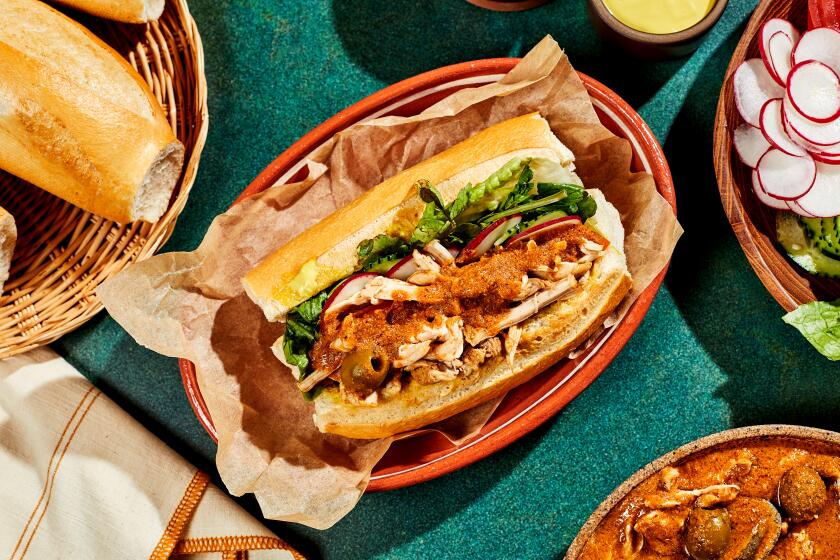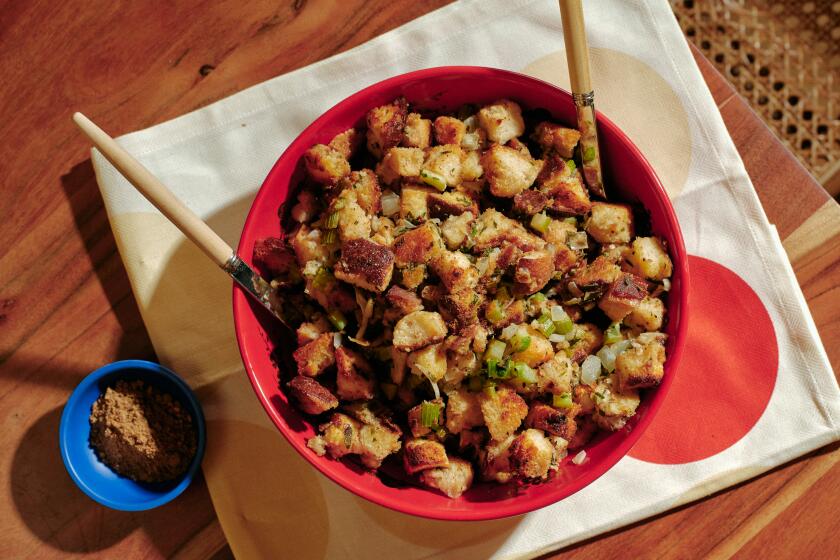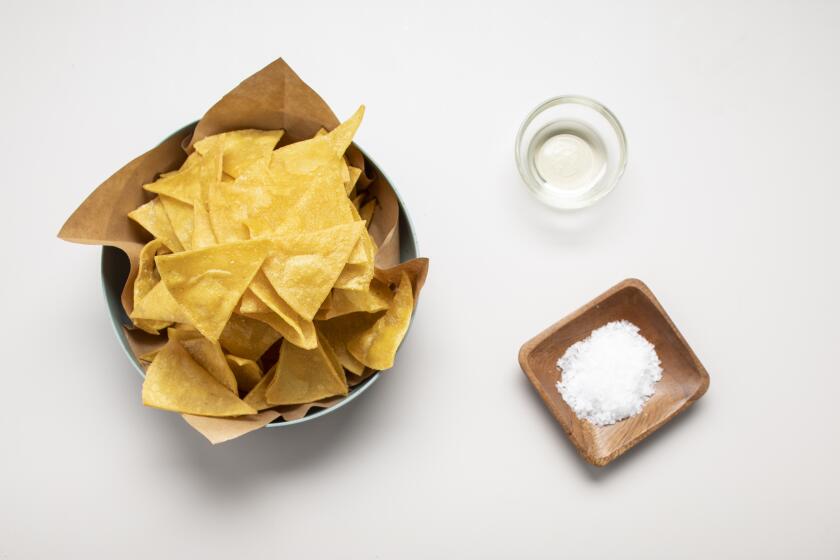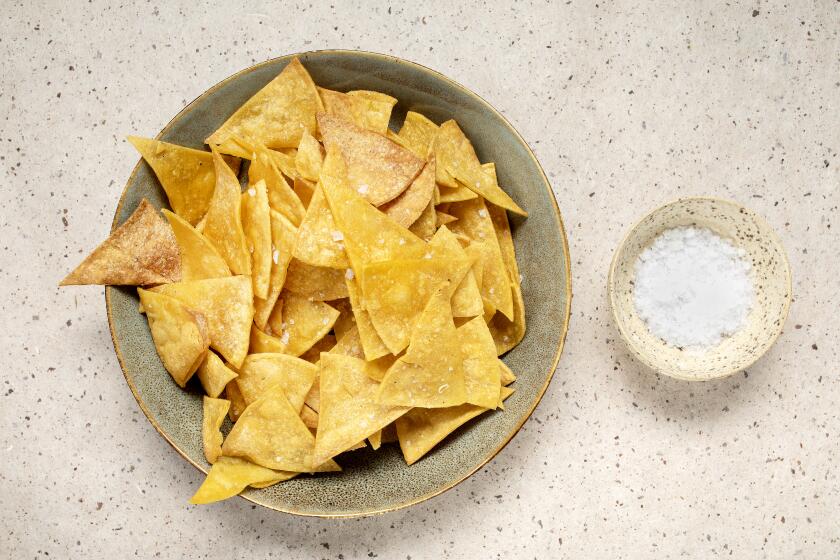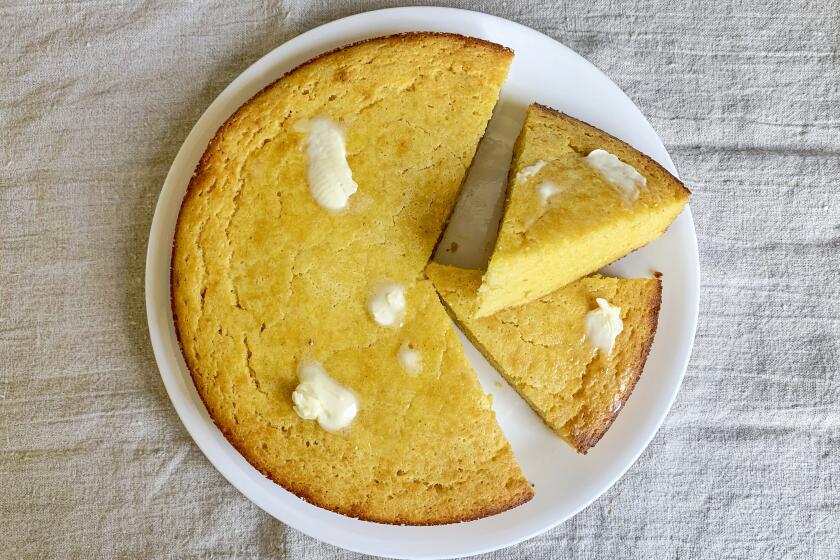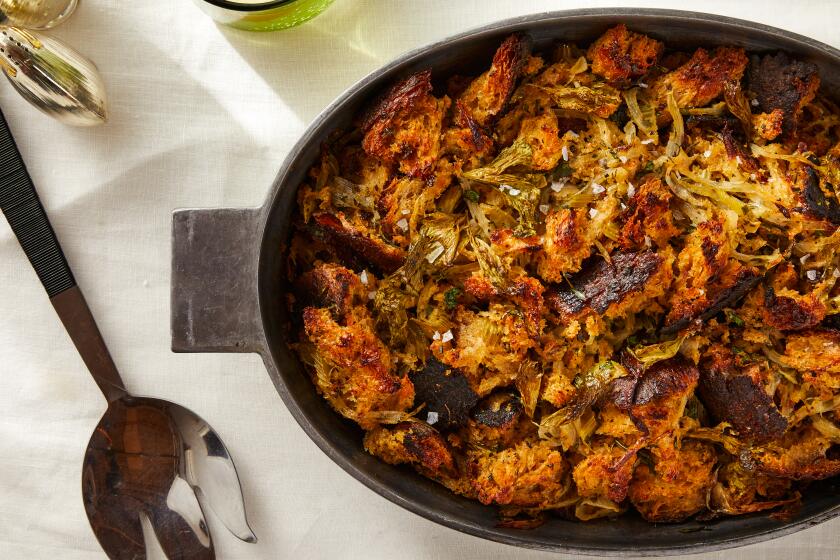Eula Mae's buttermilk biscuits
- Share via
They say that life is a journey and not a destination. That sentiment must surely include cooking, where the twists and turns of one memorable culinary adventure brought my husband and I right back home.
Many years ago, we hosted a book party for an out-of-town writer and decided to take her to dinner afterward. Our choice was the now-defunct Georgia restaurant, one of those neo-soul palaces on Melrose where celebrities were investors -- and whose major return on investment appeared to be first dibs on the best tables in the house. Star factor aside, Georgia also featured what seemed to be exorbitantly priced entrees that my grandmother could have cooked blindfolded for a fraction of the cost. But we were there anyway, as much to see what the buzz was about as to satisfy our guest, a Georgia native herself, who was curious to taste how Angelenos interpreted some of her favorite dishes.
After duly noting the glitterati in the room, we got down to the serious business of ordering our meals. Everything seemed to be going well until our server brought cornbread and biscuits swaddled in a linen napkin. Unfortunately, that napkin might as well have been a shroud because those breads were dead on arrival, which elicited a frown of disapproval from the writer and a verdict of “hockey pucks” from my husband.
--
Mr. Biscuit
His opinion is not to be taken lightly. An accomplished home cook of long standing, he started out as a 10-year-old in Chicago under the tutelage of his mother -- a Louisville, Ky., native who regularly baked biscuits and Parkerhouse rolls from scratch. Now he routinely prepares multi-course dinners as well as cakes, pies and various other goodies for our family and legions of satisfied friends. This is a man who can sample a dish and tell you whether the paprika in it is regular or Hungarian smoked. So you can imagine that cornbread and biscuits made from boxed mixes got no love from our table.
Next morning, he was up early, poring over his tattered recipe folders, then off to the supermarket and back, rattling utensils almost before I was out of my pajamas.
“Those biscuits were pitiful!” he fussed, while sifting together the dry ingredients. “I know I can do better than that!”
Thirty minutes later, we were sampling the results -- classic buttermilk biscuits -- that were definitely better than those we’d passed on the night before. I was perfectly happy, but my husband wasn’t. His pronouncement: “They’re still not light enough.”
“Maybe you should try calling my grandmother.” My maternal grandmother was 95 at the time, and still sharp, especially when it came to recipes, many of which she could recall from memory.
“I’m going to see what I can hunt down on my own,” he said. “Your grandmother’s my ace in the hole.”
And hunt he did, scouring cookbooks and magazines, consulting our foodie friends, even visiting other L.A.-area restaurants. But whether we went to John O’Groats or sampled the results from the recipes he’d find, my husband’s biscuit jones could not be satisfied.
That said, the journey had interesting detours that opened my eyes to the wonders and varieties of biscuits, including the savory ones made with sweet potatoes from Danella Carter’s “Down-Home Wholesome” cookbook, and a ginger biscuit recipe from her beloved Grummy that she contributed to an anthology we edited about Christmas and Kwanzaa.
His favorite among the novelty candidates -- and a contender for best all-around biscuit -- was a biscuit from Eula Mae Dore, a Southern cook who worked for the McIlhenny family of Tabasco sauce fame on Avery Island, La. And although the surprise ingredient wasn’t Tabasco but dried cranberries, it had all of the earmarks of a classic. “Perfectly balanced between flaky and crumbly,” his notes in the margin read. “Melts in your mouth!”
But the winner and all-around crowd pleaser was another classic, angel biscuits. My husband found the recipe in Food & Wine magazine, but I have since found it in cookbooks or the Internet in another dozen or so variations. Regardless of one’s preference for dense or flaky, traditional or something more avant-garde, we agreed that angel biscuits have a way of comforting the soul.
Reading the recipe, complete with a note that the dough can be made into biscuits all at once or portions pulled off and the rest reserved in a tightly covered bowl, stirred a memory of my mother pinching off bits of dough to make a couple of biscuits for my father’s dinner when he came home late from work, or their yeasty aroma wafting through our kitchen window as I played summertime’s last tag outside with the neighborhood kids.
But the recipe wasn’t in my mother’s recipe box, a burnished wooden affair that I had inherited, her handwriting one of the few links I had to a woman who’d died some 20 years before.
--
Luscious memories
These biscuits were as close to what she used to make as I had ever tasted. My husband was happy with them, too, and the memories they stirred of his mother and aunts. So much so he called my grandmother to share the results, bonding on the phone as they did many times over food (no wonder she always called him “such a nice colored boy,” high praise for a black woman of her generation).
“That sounds like my recipe!” she replied, making him repeat the recipe to her, confirming the ingredients and method as he read.
My husband has probably amassed a few dozen biscuit recipes -- and me a few pounds -- from his quest for the perfect biscuit, but the biggest gain for me was how the journey strengthened the bonds between us and the cooking women of our families. At the very least -- who knows? -- it may form the basis for our next literary collaboration.
--
Paula L. Woods and her husband, Felix Liddell, have written and edited three books, including “Merry Christmas, Baby: A Christmas and Kwanzaa Treasury.” Woods is also the author of the “Charlotte Justice” mystery series and reviews books regularly for The Times.
Heat the oven to 450 degrees. If using the cranberries, place them in a small bowl and cover with boiling water for 5 minutes to soften. Drain the berries, pat dry and set aside.
Meanwhile, into a large bowl sift together the flour, baking powder, baking soda, sugar and salt. Sift these dry ingredients together 4 times; this will lighten the final dough. Cut in the shortening until the mixture resembles coarse meal, then add the buttermilk and the prepared cranberries if using and stir the mixture gently until it forms a sticky dough.
With floured hands, transfer the dough to a well-floured surface and knead it lightly 8 times. Pat out the dough to one-half inch thickness, and cut out biscuits using a floured 2-inch round cutter. Arrange the biscuits upside down on a greased baking sheet so they just touch each other. (The cutter pinches the edges together, so turning the biscuits over after cutting allows them to rise a bit higher.) Gather the scraps, pat out the dough and cut more rounds in the same manner until the dough is used.
Bake the biscuits in the middle of the oven until they are golden, 10 to 12 minutes. Serve the biscuits warm.
Get our Cooking newsletter.
Your roundup of inspiring recipes and kitchen tricks.
You may occasionally receive promotional content from the Los Angeles Times.










